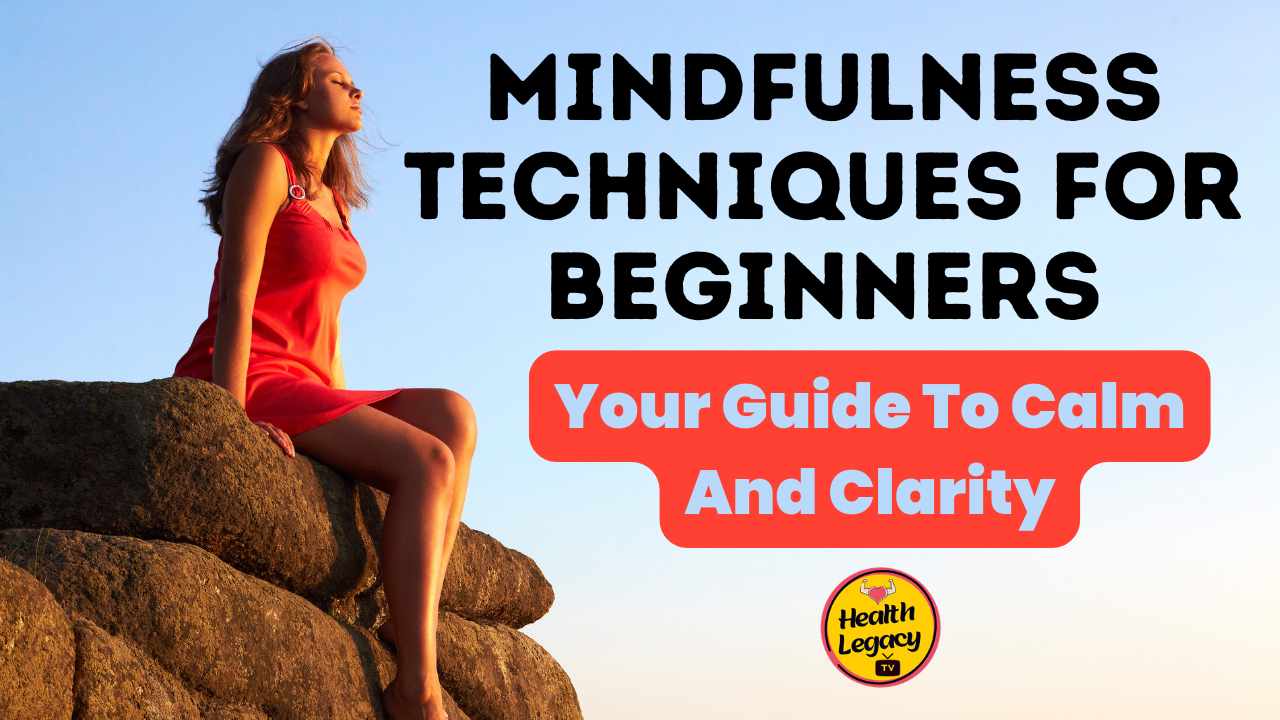10 Easy Mental Health Strategies to Feel Better Now
Welcome to Health Legacy! Today, we’re diving into a topic that touches every single one of us: mental health. It’s something we all experience, yet it’s often misunderstood or overlooked. But here’s the thing—taking care of your mental health isn’t just a nice-to-have; it’s essential for living a fulfilling life. And there’s no better time to talk about it than now, during Mental Health Awareness Month.
Did you know that Mental Health Awareness Month has been observed every May since 1949? That’s over 70 years of raising awareness about mental health issues and advocating for better care and support. This year’s theme, “Turn Awareness into Action,” is a powerful call to not just understand mental health but to do something about it. It’s about taking tangible steps to improve our own emotional well-being and providing mental health support to others.
Whether you’re a busy professional in a bustling city like New York, a parent juggling responsibilities in California, a student navigating academic pressures in Texas, or someone enjoying a quiet hike in the Rockies, mental health matters. It doesn’t discriminate based on location, age, or occupation. We all have mental health, and we all need mental health strategies to nurture it.

10 Effective Mental Health Strategies for Everyday Life
Join Devanshi Priya, our expert writer with over a decade of experience in health journalism, as she explores 10 simple yet effective mental health strategies that you can start implementing today. These are backed by expert insights and real-world examples, ensuring you get practical mental health tips that work. From self-care practices to building healthy relationships, we’ve got you covered. Let’s embark on this journey together and discover how to enhance your emotional well-being!
Also Read: Transform Your Life in 5 Simple Steps: The Ultimate Daily Wellness Routine
Strategies for Better Mental Health
Here are 10 practical mental health strategies designed for real people with real lives. They’re approachable, effective, and aimed at helping you feel balanced and supported.
Develop Coping Skills
Life is unpredictable, and sometimes it feels like we’re dodging curveballs daily. That’s where coping skills come in—they’re your personal toolkit for stress relief and resilience. Coping skills help you manage challenges, from work deadlines to personal setbacks.

Try deep breathing when stress hits: inhale for four seconds, hold for four, exhale for four. This simple technique can calm your nervous system instantly. Or grab a notebook and jot down your thoughts to clear your mind—a great way to process emotions. For example, a nurse in Chicago swamped with long shifts might use five minutes of breathing as a quick mental health tip to reset. These coping skills are key mental health strategies for maintaining emotional well-being.
Prioritize Self-Care
Self-care practices aren’t fancy—they’re the basics: sleep, good food, and movement. Think of it like keeping your car fueled up. Skimp on these, and you’re running on empty. Self-care is foundational for emotional well-being, yet it’s often the first thing we neglect.

A busy mom in Florida might carve out 15 minutes for a walk or swap fast food for a quick salad. These small self-care practices can have a big impact on your mental health. Prioritizing self-care means valuing yourself enough to recharge—essential for stress relief and long-term health.
Practice Gratitude
Focusing on what’s good can shift your entire day. Gratitude is a powerful mental health strategy that rewires your brain for positivity. Start a gratitude journal—write down three things you’re thankful for, like a sunny morning in Seattle or a kind text from a friend.

Studies show this habit boosts happiness and reduces stress, making it a simple yet effective self-care practice. A teacher in New York might use gratitude to counterbalance a tough week, enhancing their emotional well-being with just a minute of reflection.
Seek Support
You’re not meant to handle everything solo. Seeking mental health support is a strength, not a weakness. Chat with a friend, join a group, or call a therapist. In Central Texas, the Sunrise Center at Feed My Sheep offers free counseling for all—a shining example of community support.

Google local mental health resources wherever you are; help is closer than you think. A student in Colorado might find a campus group for stress relief, proving that mental health support can transform isolation into connection.
Build Healthy Relationships
Surround yourself with people who lift you up. Healthy relationships are vital for emotional well-being, acting like sunshine for your soul. Ditch the energy-drainers—say no to that friend who only complains.
A retiree in Arizona might join a book club to connect with positive folks, fostering healthy relationships that provide mental health support. These bonds are a cornerstone of mental health strategies, offering comfort and joy.
Set Boundaries
Setting boundaries keeps your mental tank full. Say no to extra work if you’re tapped out, or limit doom-scrolling to 10 minutes. A college student in Ohio might mute group chats during finals week—a practical mental health tip for stress relief.

Boundaries aren’t rude; they’re a self-care practice that protects your emotional well-being. They’re essential mental health strategies for maintaining balance in a demanding world.
Play and Relax
Fun isn’t optional; it’s a must for mental health. Kick a soccer ball with your kids, binge a comedy, or stroll through a park. A dad in Oregon unwinding with a fishing rod by the river shows how play can be a mental reset and stress relief.

These activities are self-care practices that recharge you, supporting your emotional well-being without breaking the bank.
Also Read : Top 10 Best Holistic Health Practices for Well-Being
Practice Mindfulness
Mindfulness is about being present. Try a quick meditation: sit quietly, focus on your breath for five minutes. Or take a mindful walk, noticing the crunch of leaves underfoot. A barista in Portland might use mindfulness to shake off a hectic shift.

This mental health strategy calms racing thoughts and enhances emotional well-being, making it a go-to for stress relief.
Also Read: Mindfulness Techniques for Beginners: Your Guide to Calm and Clarity 2025
Be Kind to Yourself
Cut yourself some slack—you’re human, not a robot. Messed up at work? Tell yourself, “It’s okay, I’ll do better next time.” A single dad in Georgia might forgive himself for burning dinner—a small act of self-care.
Being kind to yourself builds resilience and is a key mental health strategy for sustaining emotional well-being.

Connect with Community Resources
Help is out there if you know where to look. Dial 988 for the National Suicide Hotline—free, 24/7, anywhere in the US. Local clinics or churches often have community support groups too. A veteran in Nevada found free PTSD classes through his VA—proof that mental health resources are accessible.
Connecting with these mental health resources strengthens your support network and promotes emotional well-being.
Engage in Physical Activity
Physical activity is a proven mental health strategy that boosts mood and reduces stress. You don’t need a gym—dance in your living room, bike around your neighborhood, or do yoga at home. A busy parent in California might take their kids for a brisk walk, blending family time with stress relief.
Exercise releases endorphins, enhancing emotional well-being and complementing other self-care practices. It’s a simple way to care for your mind and body.

Why These Strategies Work
These aren’t random ideas—they’re rooted in science and real-world results. Psychology Today highlights that consistent self-care practices and compassion build mental strength over time. The Sunrise Center in Texas proves community support works, offering free classes like grief share or anger management.
Suicide prevention experts from the American Foundation for Suicide Prevention (AFSP) stress connection and spotting warning signs—core elements of our list. Research backs mindfulness and gratitude as effective for stress relief, while coping skills help regulate emotions, making these mental health strategies reliable for enhancing emotional well-being.

Real-Life Examples
Let’s see these mental health strategies in action:
- Sarah, a Teacher in New York: Swamped with grading, she uses coping skills like deep breathing at lunch and sets boundaries by skipping extra meetings, achieving stress relief.
- Jake, a Student in Colorado: Feeling down, he joins a campus group for mental health support, finding community support that eases isolation.
- Maria, a Mom in Florida: She prioritizes self-care practices with morning walks and gratitude journaling, boosting her emotional well-being.
These stories show how mental health tips fit into busy lives across the US.
Also Read : How to manage anxiety naturally-Expert Tips | Health Legacy
Suicide Prevention and Warning Signs
Mental health isn’t just about thriving—it’s about safety. Suicide prevention is critical, with suicide as the 11th leading cause of death in the US. Watch for signs: talking about death, withdrawing, or heavy drinking. If you spot these, act fast—call 988 or a loved one.
AFSP’s “Talk Saves Lives” promotes connection and physical health, aligning with our mental health strategies. Mental health awareness saves lives by encouraging early mental health support.
How to Get Started
Overwhelmed? Start small. Pick one mental health strategy—like gratitude or a five-minute walk—and try it for a week. A cashier in Minnesota might test mindfulness on a break. Add more self-care practices as you go. It’s a marathon, not a sprint—pace yourself for lasting emotional well-being.

Conclusion
You don’t need a PhD to improve your mental health—just simple steps. These 10 mental health strategies, from self-care to community support, can lift your mood and lighten your load. You’re not alone—reach out to a friend or dial 988 for mental health support. Visit Health Legacy at https://health.winimedia.com for more mental health tips and take that first step today. You’ve got this!
Also Read : Top 5 Best home workout routines for beginners, home fitness for newbies.
FAQs
What are some easy mental health tips for busy people?
Quick wins like a 5-minute walk or deep breathing fit any schedule.
How can I find mental health resources near me?
Search online or dial 988 for nationwide mental health support.
What’s the best way to practice gratitude?
Write down three things you’re thankful for daily—simple and effective.
How do I know if I need professional mental health support?
Feeling hopeless or withdrawing? Seek a therapist or community support.
Can mindfulness really help with anxiety?
Yes—focusing on the moment offers fast stress relief.
How do I set boundaries without guilt?
It’s a self-care practice—protecting your peace isn’t selfish.
Why is Mental Health Awareness Month important?
It drives action, reduces stigma, and boosts access to mental health resources.



